Archive
31 July 2020
TU Delft research partner in innovative wind farm Hollandse Kust Noord
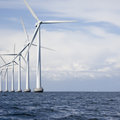
As the research partner in the so-called Hollandse Kust Noord (HKN) project, TU Delft is playing a significant role. Once the wind farm has been built, researchers, led by Professor Jan-Willem van Wingerden, will be able to test their findings regarding wind energy in practice, and the amount of energy generated by the wind farm will be maximised.
29 July 2020
TU Delft opens up 16 positions for Assistant Professors in AI (related) research
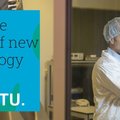
TU Delft announced it is recruiting 16 talented researchers to become a member of a thriving Artificial Intelligence (AI) community.
29 July 2020
TU Delft students reveal hidden inscriptions from NSB leader
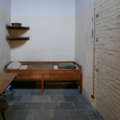
Led by Professor Joris Dik, a group of TU Delft bachelor's students was able to discover the secrets of this part of the wall without damaging it. The students’ graduation thesis was published this week in academic journal Heritage Science.
17 July 2020
Physics course eases the transition to university for secondary school students
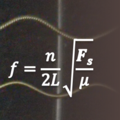
13 July 2020
Never fall again thanks to backpack-like wearable robot
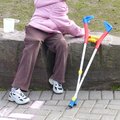
Balance aids currently used in daily life and rehabilitation clinics are helpful but far from perfect. Canes, walkers, crutches, and handrails modify posture and prevent the hands from being used during activities like opening doors, carrying shopping, or answering the telephone. Also more sophisticated tools like mobile bodyweight support systems or robotic gait trainers are bulky or can only be used in specific environments. Andrew Berry, Daniel Lemus and Saher Jabeen, researchers BioMechanical Engineering at TU Delft, led by Professor Heike Vallery, developed a backpack-like wearable robot to provide balance support during rehabilitation; the GyBAR. Fully contained within the backpack is a gyroscopic actuator – a spinning disc repositionable with electric motors – to provide hands-free balance support in multiple activities and environments. The results of the first experiments with human subjects and potential end-users have been published in Nature Scientific Reports.
13 July 2020
Year of the Lecturer 2020: a unique way to say ‘Thank you!’
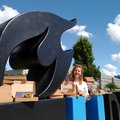
Because of the special period in recent months all TU Delft Lecturers have been put in the spotlight by the students.
02 July 2020
Mechanical engineering students design inventive pack
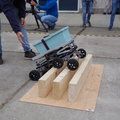
The WB62 student group has won the Mechanical Engineering Design Contest with its pack dog ‘The Scarab’.
30 June 2020
Historic floods reveal how salt marshes can save lives in the future
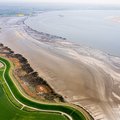
Coastal wetlands like salt marshes are increasingly recognized as valuable natural defenses that protect coasts against strong wave attacks.
30 June 2020
New software brings quantum network design to users around the world
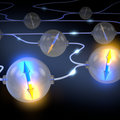
NetSquid, a specialized simulator for quantum networks has been made freely available for non-commercial users. In development by QuTech since 2017, the software is the first of its kind to model timing effects using discrete events. NetSquid allows researchers around the world to accurately predict the performance of quantum networks and modular quantum computing systems. Such simulations are essential to design scalable quantum systems, and exploit them for radically new types of computation and communication technologies.
25 June 2020
First detector array delivered to GUSTO mission
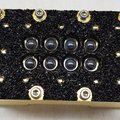
The first detector array for NASA's GUSTO mission has passed its pre-shipment review and is now shipping to the University of Arizona for integration into the balloon observatory. SRON together with TU Delft develops GUSTO's three 8-pixel-arrays, for the frequencies 4.7, 1.9 and 1.4 terahertz. They have now finished the array for the 4.7 terahertz channel—the most challenging part. GUSTO is a balloon mission that will measure emissions from cosmic material between stars.
23 June 2020
New measuring equipment accurately maps out the atmosphere above the TU Delft Campus
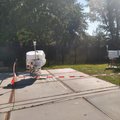
A compact and mobile cloud radar will deliver high resolution images of the cloud compositions above the TU Delft Campus.
19 June 2020
Spinoza Prize for Nynke Dekker
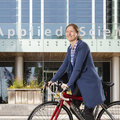
NWO has announced that TU Delft's Nynke Dekker has been awarded an NWO Spinoza Prize. The Spinoza and Stevin Prizes are the most prestigious awards in Dutch science. Besides Nynke Dekker, prizes were also awarded to prof. dr. ir. Jan van Hest (TUE), prof. dr. Pauline Kleingeld (RUG) and prof. dr. Sjaak Neefjes (LUMC/UL). Prof. dr. Linda Steg (RUG) en prof. dr. Ton Schumacher (AVL/LUMC/UL) have been awarded a Stevinprize. Each of the laureates will receive 2.5 million euros to spend on scientific research and related activities.
18 June 2020
Impulse health & technology research with nine new Medical Delta professors
Nine professors are now allowed to call themselves ‘Medical Delta professors’. They received a dual appointment at two or more academic institutions (LUMC, Leiden University, TU Delft, Erasmus MC, Erasmus University) that are affiliated with Medical Delta. This will boost health & technology research once again.
16 June 2020
Researchers create a new class of rate-sensitive mechanical metamaterials
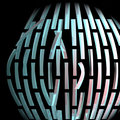
Researchers at the Department of Biomechanical Engineering of Delft University of Technology have created a new class of metamaterials that can dynamically switch their mechanical behaviour. It may form the basis for practical applications such as fall-protective clothing for the elderly. The results are to appear in the journal Science Advances on 17 June.
11 June 2020
Help from an unexpected quarter: geosciences data techniques can help predict corona spread
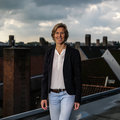
An international team of scientists is studying the possibility of using data assimilation, a data technique from geosciences, to predict the spread of coronavirus and the efficacy of certain measures. TU Delft geoscientists on the team think that data assimilation might prove a useful tool for the RIVM epidemiologists. A paper on the subject has been submitted to scientific journal Foundations of Data Science.
09 June 2020
Undecided citizens are the deciding factor when introducing corona app

The Dutch have widely varying opinions on the desirability of a tracking and tracing corona app
08 June 2020
Francine Houben TU Delft Alumnus of the Year 2020

Francine Houben, founder and Creative Director of Mecanoo Architects, has been elected TU Delft Alumnus of the Year 2020.
08 June 2020
Francine Houben TU Delft Alumnus of the Year 2020

Francine Houben, founder and Creative Director of Mecanoo Architects, has been elected TU Delft Alumnus of the Year 2020.
04 June 2020
Universities of technology join forces in Techrede address
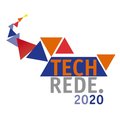
The four universities of technology in the Netherlands (Delft, Eindhoven, Twente and Wageningen) appeal to political leaders in The Hague to make technological innovation a structural part of their agendas. Technological innovations are a vital link in the transition process to a resilient, safe and sustainable future. The post-corona future comes with new social challenges that require new solutions. The first Techrede address is scheduled to take place on 1 October and aims to impress upon everyone not only the importance of these types of innovations but the importance of public involvement as well.
04 June 2020
A virtual inner voice can help develop social skills
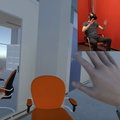
Social interactions make up a large part of our life, but social skills don’t come naturally to all. You can train them with self-help books or courses, and in recent years also with training systems based on supporting technologies such as virtual reality.
03 June 2020
Research into a climate-neutral built environment united in TU Delft Urban Energy Institute

At TU Delft, various aspects of that energy use are being researched, with the aim of drastically reducing the use in urban areas and generating the remaining energy from sustainable sources. This research is now officially bundled in the Urban Energy Institute.
02 June 2020
TU Delft launches first eight TU Delft AI Labs
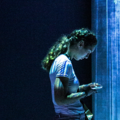
How can artificial intelligence (AI) accelerate scientific progress? Delft scientists will investigate this question in eight new 'TU Delft AI Labs'.
29 May 2020
The real risks of a pandemic

The COVID-19 pandemic is a reflection on our society and shows us just how vulnerable we are, despite all the advanced mathematical models that are supposed to make policy- and decision-makers aware of the potential risks associated with a pandemic. ‘Yet,’ write scientists Pasquale Cirillo (TU Delft) and Nassim Nicholas Taleb (New York University) in their recently published paper in Nature Physics, ‘most of these models do not look at the tail risk of infectious diseases, and there is very little questioning of the reliability of the various parameters.’ According to the scientists, extreme value theory (EVT) offers a solution for modelling the actual risks of a pandemic.
27 May 2020
Intermittent computing to replace trillions of batteries
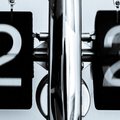
25 May 2020
Researchers build sensor consisting of only 11 atoms
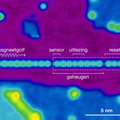
Researchers at Delft University of Technology have developed a sensor that is only 11 atoms in size. The sensor is capable of capturing magnetic waves and consists of an antenna, a readout capability, a reset button and a memory unit. The researchers hope to use their atomic sensor to learn more about the behaviour of magnetic waves, so that hopefully such waves can be used in green ICT applications one day.
25 May 2020
Evacuating virtual buildings

Virtual Reality (VR) is not just about gaming or flight simulators. At TU Delft, PhD Yan Feng is investigating how it may help explain the behaviour of pedestrians. It took her just five months to teach herself how to create a complex virtual building. By then she had built an exact replica of her faculty building and invited real people to explore and evacuate it. So how did they find their way around?
19 May 2020
Can walking and cycling make us healthy and happy?
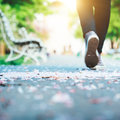
Do walking and cycling make people healthier, or are healthier people more inclined to travel actively? And how does the coronavirus affect our travel behaviour? These are the kinds of questions that scientist Maarten Kroesen is investigating. In his view, situations are often not as simple as they might seem at first glance. He is nevertheless convinced of one thing: we should be walking and cycling more.
14 May 2020
How copper can damage a cell
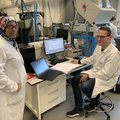
Copper is important for many processes in our body. Among other things, it supports the production of red blood cells, metabolism, and the formation of connective tissue and bones. Copper is also known to play a role in diseases such as cancer, diabetes and Alzheimer's disease. Unfortunately, we do not yet know exactly what that role entails. Researchers from Delft University of Technology and the Polish Academy of Sciences have now discovered a new piece of the puzzle. In order to be able to do its work, copper binds to different types of proteins in the cell. And although the complexes that are formed in this process are not harmful in themselves, temporary 'intermediate forms' appear to arise during the binding, which can lead to damage to the cell. The results of the research have been published in Angewandte Chemie.
13 May 2020
Social Distancing Dashboard provides roadmap for city dwellers
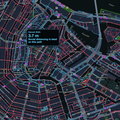
The Social Distancing Dashboard creates city maps that show on a street and neighbourhood level if social distance rules can be respected when moving in public space.
07 May 2020
We\Visit: combatting loneliness with video calling

For patients hospitalised with COVID-19, the battle is not just a physical fight against the virus, it’s a psychological struggle against isolation. Witnessing the impact of isolation on coronavirus patients, the Renier de Graaf Hospital in Delft reached out to scientists at Delft University of Technology to ask for help in developing an easy-to-use and secure communications platform.
06 May 2020
Dutch public in favour of limited relaxation of coronavirus measures

Dutch people believe that any relaxation of measures to control the coronavirus should be limited, in order to prevent the healthcare system becoming overstretched. They also think that the measures should not be allowed to sow division: there is no support for lifting restrictions for specific groups.
06 May 2020
TU Delft students share ventilator design for international use
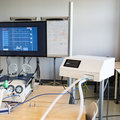
In a very short period of time, students involved in OperationAIR have successfully developed an emergency ventilator for coronavirus patients. Following the necessary test procedures, the design of the AIRone – including all related documentation – has now been released online so that other countries and initiatives can also benefit from it.
30 April 2020
Investment of 14 million for better use of micro-organisms
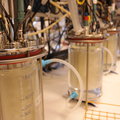
28 April 2020
Mechanical ventilator to Guatemala
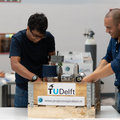
The researchers of Project Inspiration have made all of the designs for their mechanical ventilator available worldwide. In this way, the team hope to reduce the shortage of ventilators in the Netherlands and abroad. In addition, a test model has been prepared, and it will soon be sent to Guatemala.
28 April 2020
TU Delft to launch online survey of preferred exit scenarios on 29 April

TU Delft researchers will be asking people in the Netherlands on how they would prefer coronavirus measures to be relaxed. From 29 April, anyone will be able to make their preferences known at www.tudelft.nl/covidexit.
27 April 2020
TU Delft researchers gain new insights into Vermeer’s Girl with a Pearl Earring

Scientific research into the world-famous painting by Johannes Vermeer, known as the 'Girl with a Pearl Earring', has yielded new insights. TU Delft researchers played an important role in making discoveries about the brushwork, the use of pigments and how Vermeer built up his painting with various layers of paint.
24 April 2020
Royal Honor 2020 Prof. Richard Goossens
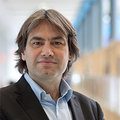
Richard Goossens, Professor of Physical Ergonomics in the Faculty of Industrial Design Engineering (IDE), has been made a Knight of the Order of the Netherlands Lion in Vlaardingen. Because of the coronavirus, the official presentation will take place later in the year.
24 April 2020
TU Delft and NS study the impact of the coronavirus crisis on travel behaviour
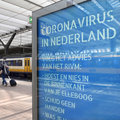
22 April 2020
TU Delft supports COVID-19 ResilientSociety platform
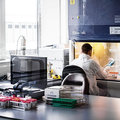
20 April 2020
Microorganisms work together to survive high temperatures
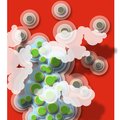
Delft researchers demonstrate that microorganisms can work together and help each other and their future generations survive and replicate at high temperatures.